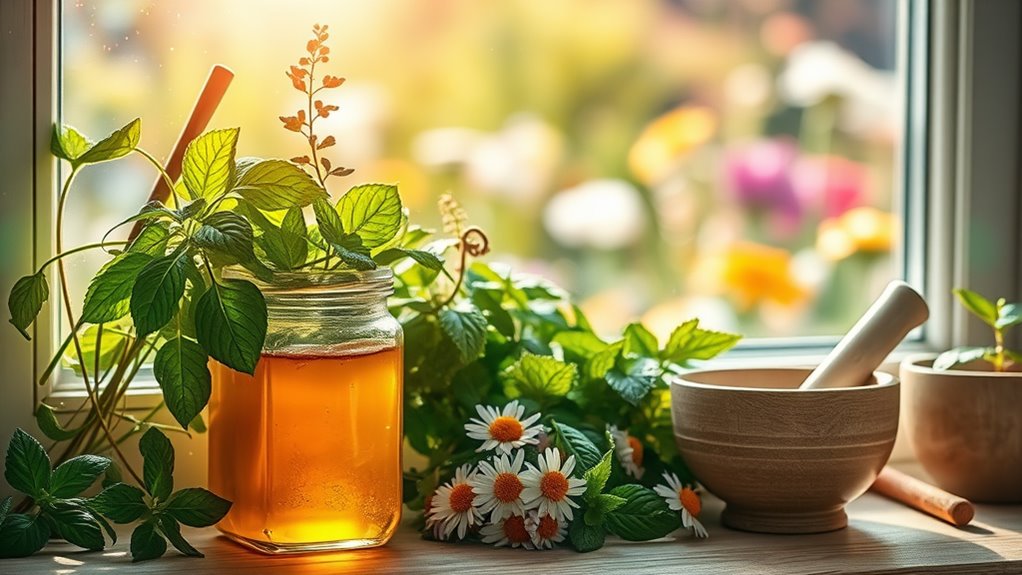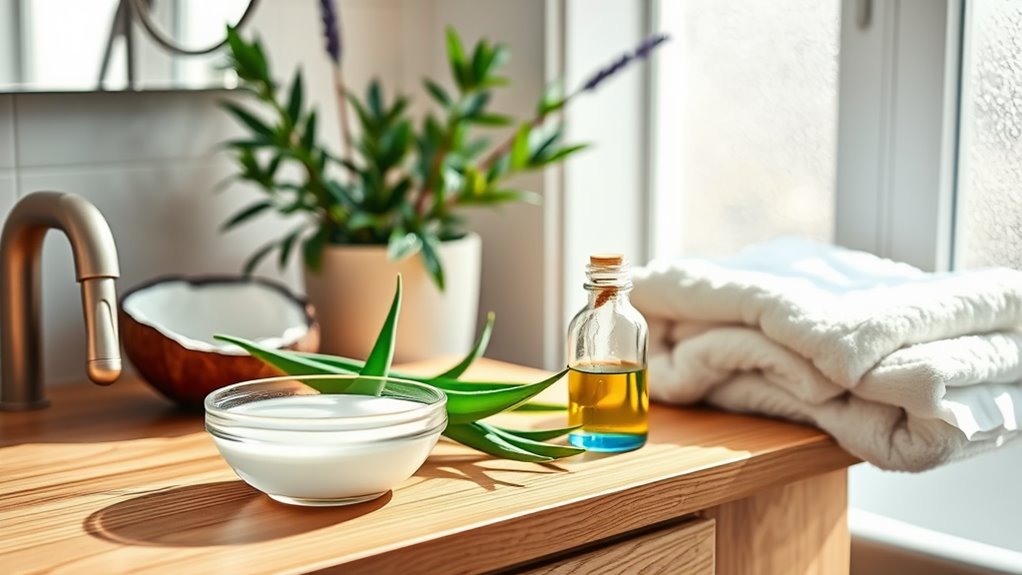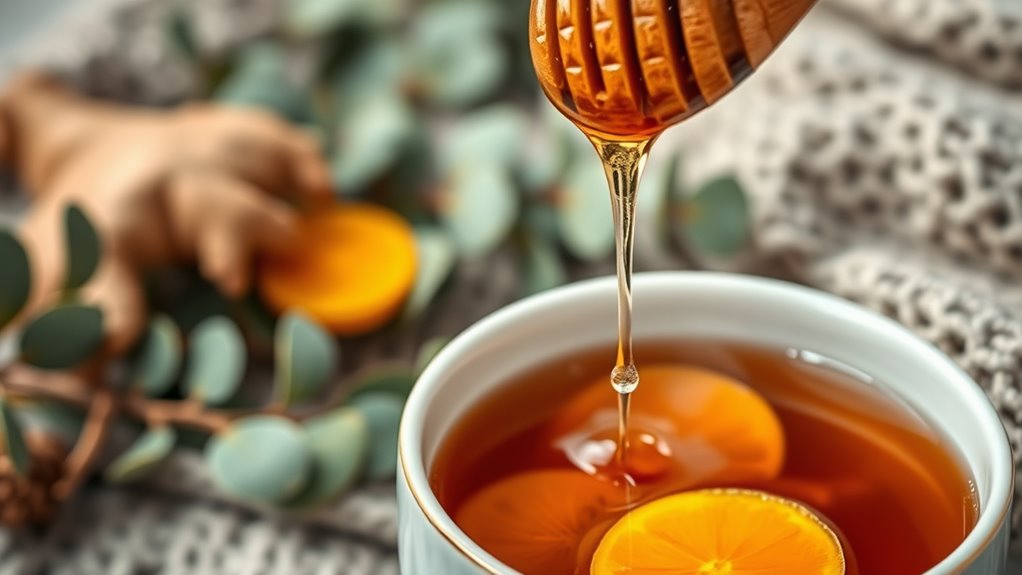Get Rid of Seasonal Allergies Naturally With This Easy Hack!
To get rid of seasonal allergies naturally, start by making simple lifestyle changes. Keep windows closed during high pollen seasons and invest in an air purifier to improve indoor air quality. You can also rinse your nasal passages with saline to clear allergens. Incorporating local honey, omega-3 fatty acids, and anti-inflammatory foods can boost your immunity. Finally, using essential oils like eucalyptus and lavender can help soothe your symptoms. There’s more you can do for relief!
Understanding Seasonal Allergies
Seasonal allergies occur when your immune system overreacts to allergens in the environment, such as pollen from trees, grasses, and weeds. You may notice the symptoms during certain times of the year, leaving you feeling isolated, uncomfortable, and overwhelmed.
It’s important to recognize that you’re not alone in this struggle; many people share your experience and seek effective allergy remedies. To tackle seasonal allergies effectively, you’ll want to build awareness of your triggers and develop strategies to manage them. Start by keeping windows closed during high pollen counts, rinsing your hair, and showering after spending time outside. You might also consider utilizing air purifiers in your home. Regular nasal irrigation can also help clear allergens from your nasal passages. While these steps won’t completely eliminate your symptoms, they can provide significant relief.
Common Natural Remedies
Finding relief from seasonal allergies often leads individuals to explore natural remedies that can complement their efforts in managing symptoms. One popular option is local honey. Consuming it can help your body build resistance to pollen, as it’s made from the very substances triggering your allergies.
Another effective remedy is using a saline nasal rinse. This simple practice clears out allergens and soothes irritated nasal passages, allowing you to breathe easier.
Essential oils, like lavender and eucalyptus, can also provide relief. Just a few drops in a diffuser can help reduce inflammation and promote relaxation.
Lastly, consider investing in a good air purifier to cleanse your indoor air. These remedies foster a sense of community as you connect with others who share your struggles. Additionally, incorporating omega-3 fatty acids into your diet can further help reduce inflammation associated with allergic reactions.
Embracing these natural options not only eases your symptoms but also enhances your well-being, creating a more comfortable environment for you and those around you.
Dietary Adjustments for Allergy Relief
Here are some powerful dietary changes to consider:
-
Increase Omega-3 Fatty Acids****: Incorporate more fatty fish, flaxseeds, and walnuts to help lower inflammation.
-
Add Local Honey****: Consuming local honey may expose you to local pollen, potentially decreasing your overreaction.
-
Boost Antioxidants: Fill your plate with colorful fruits and veggies—think berries, spinach, and carrots—to strengthen your body’s defenses.
-
Stay Hydrated: Drinking plenty of water flushes out toxins and keeps your mucous membranes moist, which can help alleviate congestion.
-
Regularly including anti-inflammatory foods like turmeric and ginger in your meals can further enhance your body’s ability to combat allergic reactions.
Lifestyle Changes to Reduce Exposure
To effectively manage your allergy symptoms, adopting lifestyle changes that reduce your exposure to allergens can make a significant difference.
Start by keeping windows closed during high pollen seasons, and use air purifiers indoors. You’ll find it helpful to shower and change clothes after outdoor activities, as this removes any pollen you might carry inside.
Also, consider your daily routines; try to vacuum regularly with a HEPA filter to catch those pesky particles.
If you’re an animal lover, bathe your furry friends weekly to minimize dander in your home.
Finally, stay informed about local pollen counts and plan your outdoor activities accordingly. Incorporating HEPA filters into your home can significantly improve air quality and reduce allergens.
You’re not alone in this journey! By making these changes, you’ll create a more comfortable environment for yourself and everyone around you.
Embrace these habits and join others in your pursuit of a sneeze-free life!
The Role of Essential Oils
While lifestyle changes can significantly reduce allergy symptoms, incorporating natural remedies like essential oils may further enhance your relief.
These potent extracts can help soothe your irritated system and create a sense of well-being among friends who share similar struggles.
Here are four essential oils you might try:
-
Peppermint Oil: It’s great for opening up airways and reducing sinus congestion.
-
Lavender Oil: Known for its calming properties, it can help reduce stress and improve sleep quality.
-
Eucalyptus Oil: This oil helps clear respiratory pathways and promotes easier breathing.
-
Tea Tree Oil: With its antimicrobial properties, it assists in reducing allergens in your environment. Additionally, using essential oils in a diffuser can enhance their effectiveness in improving indoor air quality.
Creating an Allergy-Free Home Environment
How can you create a home environment that’s free of allergens? Start by decluttering your space. Remove dust collectors like old magazines and stuffed toys.
Next, invest in high-quality air purifiers equipped with HEPA filters to trap particles floating around. Regularly change the filters in your HVAC system to ensure clean airflow throughout your home.
Consider using mats and rugs that are easy to clean—not just pretty to look at. When you vacuum, make sure to use a vacuum designed for allergy sufferers.
Choosing hypoallergenic bedding and washing it weekly in hot water will keep dust mites at bay.
Finally, maintain humidity levels in your home. A dehumidifier can help prevent mold growth, another common allergen. Additionally, incorporating nasal irrigation into your routine can further enhance your allergy management strategy.




